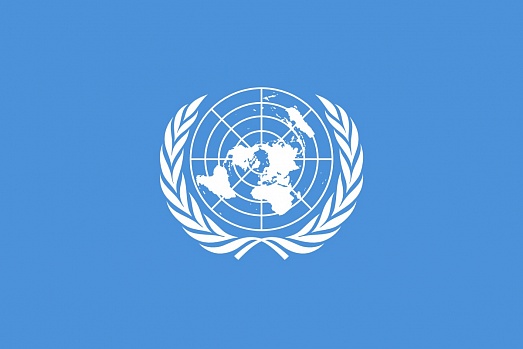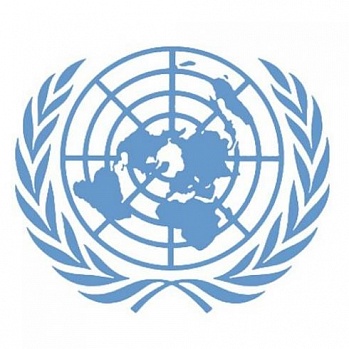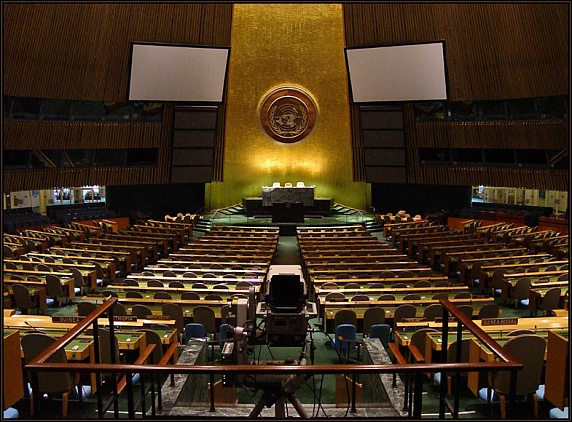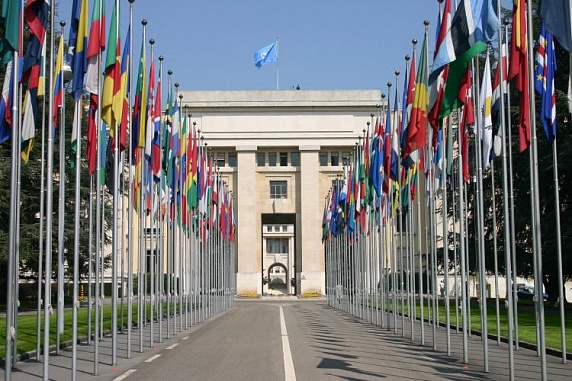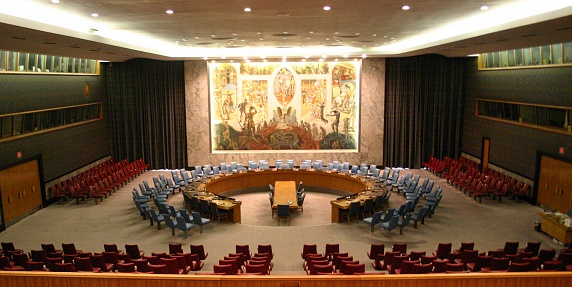 Die UNO
Die UNO
TRANSCRIPT OF RUSSIAN MINISTER OF FOREIGN AFFAIRS IGOR IVANOV INTERVIEW WITH TIMES CORRESPONDENT MICHAEL BINYON, MOSCOW, NOVEMBER 28, 2003
Unofficial translation from Russian
Question: The results you have achieved in Georgia are widely recognized in the world. How do you perceive the development of relations between Russia and Georgia?
Foreign Minister Ivanov: Unfortunately, the crisis in Georgia had long been brewing. This wasn't the crisis of a day or week. It was the result of systemic mistakes by the previous leadership in both domestic and foreign policies, as a result of which resentment had been growing in society. The economy had been fully ruined, democratic principles were missing. As a result of the growth of such resentment the country had come up to the crisis in which it found itself. The instruction I had received from President Putin was to prevent that resentment from developing into violence and try to settle the crisis within the constitution and law. At this stage a dialogue was helped to be resumed between Eduard Shevardnadze and the opposition. They came to an agreement. Unfortunately, this decision does not solve the deep-going problems with which Georgia is faced. We consider it important that the political leaders should within the constitution hold an open, transparent election for lawful bodies of power which could assume responsibility for the solution of the major problems before Georgia today.
As to Russia, it never has interfered in the internal affairs of Georgia. Russia has always recognized and continues to recognize the territorial integrity and sovereignty of Georgia. Our country has a keen interest in developing the closest, good-neighborly, friendly relations with Georgia. The peoples of our countries are bound by historical and cultural ties, and we are interested in such being the case in the future as well. For our part, we, of course, will render all the necessary assistance to the lawful authorities of Georgia in overcoming the crisis.
Question: Differences had existed between Russia and Georgia before. Do you think the new leadership of Georgia will respond to the concerns of Russia?
Foreign Minister Ivanov: We did have differences with the previous leadership of Georgia on certain problems, primarily those linked to the fight against terrorism. Unfortunately, only after several years both the leadership of Georgia and the international community acknowledged that terrorists had been penetrating into Russia from the territory of Georgia. We had been referring to this. But our voice had not been listened to, in the belief that this was an attempt at pressure on Georgia. Only later, when the facts had become obvious, did everybody have to admit that we had been telling the truth. There were other differences as to how to resolve the Abkhaz problem, and so on. In spite of those differences, when the crisis arose, we took the side of the lawful leadership, we recognized Shevardnadze and we firmly insisted on observance of the constitution and legality.
At the same time I want to say that in exacerbating this crisis, and these facts are becoming ever more obvious, a role was played by certain states; even former President Shevardnadze said pressure had been put on him personally and on certain political forces. Moreover, the countries were so doing that had publicly used to say they were the best friends of Shevardnadze. So the question arises - what sort of friendship is this?
Question: When American specialists were sent to Georgia, this aroused the concern of Russia. You were saying that Georgia should have notified Russia. Do you think that Georgia made a mistake by turning to the West without taking counsel first with Russia?
Foreign Minister Ivanov: Georgia is a sovereign, independent state and it has itself the right to choose its foreign policy orientation. Georgia is not obligated to inform anybody or to receive the sanction of anyone. Therefore we treat with respect the foreign policy choice of Georgia. The point is not what choice Georgia makes. The main thing is that a threat to the security of Russia should not emanate from the territory of Georgia. This is the only and main condition we are laying down.
Question: Do you see the danger in that some CIS countries might follow the example of Georgia by using massive demonstrations?
Foreign Minister Ivanov: Formally Shevardnadze resigned himself. The constitution does so provide. At the same time we cannot fail to consider in what circumstances he resigned. The President of Georgia was forced to take this step, and the pressure was both internal and external. Formally the constitutional norms were observed, but in practice it's unlikely somebody will be pleased with the form in which this occurred.
Now as far as other CIS nations are concerned. Unfortunately, the methods which were employed in Georgia, namely, the methods of pressure and attempts at interference in internal affairs, are being used in other countries too. There is evidence of this as well. In the joint statement of foreign ministers of CIS states, taken in Kiyv several days ago, we pointed out that we are for respect of democratic principles and human rights and will strictly abide by these principles, but that we categorically oppose attempts to put pressure on our countries, or, especially, attempts to interfere in internal affairs.
Question: In respect of Iraq you are talking about what is occurring there as if those were unilateral steps. What is your perception of cooperation with the US in the reconstruction of Iraq? How can Russia assist in resolving the Iraq crisis?
Foreign Minister Ivanov: I think that in view of the situation now evolving in Iraq, the issue is not so much about helping Iraq as about the international community helping itself. Today everybody is in a difficult situation, not just Iraq. Of course, the people of Iraq are suffering in the first place. But it is also the neighbors of Iraq who are in a difficult situation and the coalition forces as well, who are suffering losses every day. The international community is in a difficult situation, seeing as it does that Iraq, if the situation continues to develop as it has been developing at present, may turn into a new center of international terrorism. Therefore, we must think how to help Iraq and the international community get out of the crisis. Russia, and not just it alone, but also a majority of other countries, are ready for cooperation, but on certain principles, which we clearly set forth in the UN Security Council.
We hold that the process of political settlement should be carried out under the aegis of the UN. I think this does not infringe on anybody's interests, but, on the contrary, will help unite the efforts of the international community. It is necessary to hold a representative international conference with the participation of leading political and religious forces of Iraq, as well as the neighboring states and leading countries of the world, the permanent members of the UN Security Council. At this conference it is necessary to approve a plan of concrete actions and primarily a plan for the transfer of sovereignty to the representatives of the Iraqi people. Then this plan, drawn up at the international conference, should be approved by the UN Security Council. If such a scheme is followed, the Iraqi people will see that the occupation is over and that a new chapter of political settlement is beginning. Only then will the Iraqi people believe that such a political settlement is really possible. Simultaneously a mandate for a multinational security force should be fixed and would be linked to the calendar of political settlement.
Russia has repeatedly set out these proposals both in the UN Security Council and at a bilateral level to our partners. We see that to a certain extent they are receiving their development; in particular, Washington had taken a decision to accelerate the transfer of power to the representatives of the Iraqi people. At the same time we do not think this is enough. It is half-hearted steps which will not yield the desired effect. If the people in Washington realize that it is necessary to place the settlement process under the aegis of the UN and to include in it the international public at large, and Russia is ready to participate in this process, then I think everybody stands to gain by this: both the Iraqi people and the US, as nobody wants the crisis in Iraq to continue, that people would go on dying there, including citizens of the US and other countries.
Question: Do you think cooperation in the struggle against international terrorism is continuing satisfactorily? Don't you think that western states aren't helping Russia in sufficient measure?
Foreign Minister Ivanov: I think that after September 11, 2001, a serious rethinking of the problem of the fight against terrorism occurred in the world. People in the world saw that it had been terrorism that had turned into the chief threat, against which it was necessary to struggle jointly. Over this period we have traveled a very long way in expanding cooperation, and, most important, in expanding mutual trust in the fight against a common enemy. At the same time a lot of work still lies ahead of us, because, unfortunately, we have not yet got rid of stereotypes of the past, of double standards. Here we are going to have together to exert a lot of effort to ensure that indeed the antiterrorist campaign becomes a fundamental element of the partnership in the 21st century. Toward this end, I repeat, it is necessary to get rid of the Cold War stereotypes, to abandon double standards. If we are talking about double standards, then, regrettably, we find examples in Britain too: the legal proceedings against Zakayev, and most important, the decision of the Home Ministry to grant him asylum. We regard this as an insult to all the many victims who fell at the hands of terrorists in Chechnya and in other cities in the Russian Federation. We express deep regret that the Ministry has ignored public opinion in Russia and has taken such a decision.
Question: Do you think that such a decision can inflict harm upon the future cooperation between Russia and Britain in the fight against terrorism?
Foreign Minister Ivanov: I would hope that this decision will not set a precedent but will be the last of such a kind, when a terrorist is granted political asylum. If this line continues, this, of course, will complicate our joint fight against international terrorism, as every terrorist will try to portray himself as a political victim, and in this way avoid the punishment by law for the crimes committed by him.
Question: What is you attitude to the so-called anti-Russian campaign over Chechnya? And in particular, what do you have against people who have left the country, such as Gusinsky and Berezovsky? Are they using the Chechnya problem in their game against Russia?
Foreign Minister Ivanov: Regrettably, a wave of criticism against Russia over the developments in Chechnya is occasionally rising in Western Europe. The actors in the assemblies being organized on this occasion are a handful of 10 or 15 people who are moving from one country to another. Moreover, what is really taking place in the Chechen Republic fails to be taken into account in all this. The films being shown at those get-togethers are films of the past. Yes, the events being shown in those films did take place, but that was a couple of years ago. Over this time the situation in Chechnya has radically changed. Yet they continue to show those old sequences in order to compromise what is being done today. Nobody is talking about the referendum held in Chechnya, or about the Constitution, or about the President elections or about the fact that no combat actions are actually being conducted there, that the economy is being rehabilitated, that local children attend school, that the universities are working, and so on. A silence is being maintained on all the positive things that have been done over the last few years. I think public opinion in Europe should approach more critically this kind of shows, which are trying to cast a shadow upon our relations, for people stand behind this who are not interested in the rapprochement between Western Europe and Russia, which has been observable in the last few years. We should not allow such campaigns to hinder the historical choice of our countries to jointly build a Greater Europe, secure, democratic and prosperous.
Question: Do you see ways for resolving the Israeli-Palestinian conflict? How can Russia help to facilitate its settlement?
Foreign Minister Ivanov: The Quartet of International Mediators has played and continues to play a positive role. It seems to me that its role is not yet over. The Road Map, prepared by the Quartet, has been approved by the UN Security Council unanimously. This indicates that this document has received a strong backing from the UN and the international community. Simultaneously both in Israel and in Palestine the movement of supporters of the search for a compromise is increasing. We know of the so-called Geneva Initiative that has been put forward. It is obvious that in Israel too the positions of the forces are growing stronger who understand that a peaceful, political, and not a military solution is needed. The same is taking place in Palestine as well. In my opinion, we are now coming up to a very important stage where it is necessary to step up the Quartet's role even more. There should be no separating the roles of the US, Russia and Europe. Our strength is precisely when we act together and in a coordinated way. Russia will continue to promote the Quartet's ongoing active role in Middle East settlement. Although the situation remains very complicated, signs have appeared in the last few weeks that the positive capital, which is set, in particular, into the Road Map, is beginning to produce results. The positions of the supporters of a political settlement are becoming consolidated in the public opinion of Israel and Palestine.
November 30, 2003
